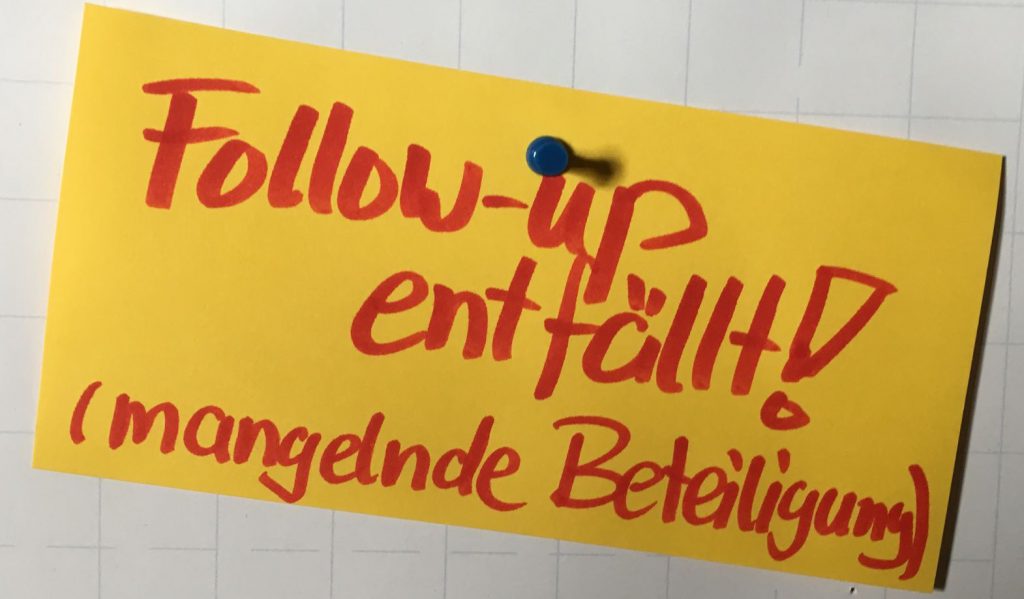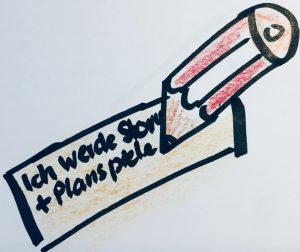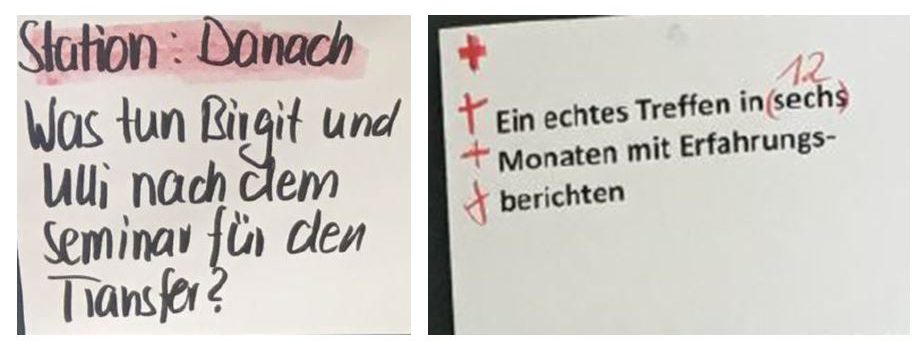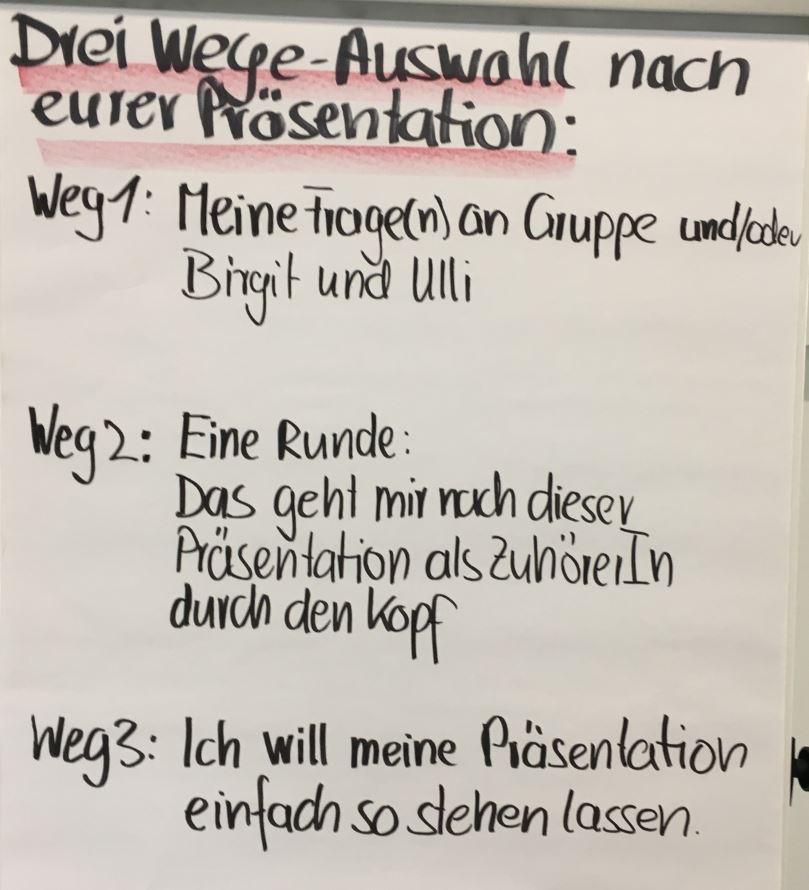The Follow up: better transfer by follow up-Seminars

Objectives of follow-ups:
- Deepening of what has been learned
- Reflection of transfer experiences
- Gentle pressure“ to implement
- Feedback for trainers
A follow-up is a subsequent event after a seminar or training course that is carried out after a certain period of time has passed. Classically it looks like this: Three days of training and one day of follow-up six months later.
Follow ups – the horror of the education departments
Follow-ups cause work, in principle as much as a separate seminar. Anyone who organises and manages educational measures knows this. Even if the follow-up is already planned before the start of the training measure, problems arise. The number of participants becomes significantly smaller. Some simply do not have time for the follow-up appointment. They do not come because they would have to admit that they have implemented nothing or very little. Or they fear that they will not benefit and learn nothing new, because it is „only“ about reprocessing the experiences of others.

Worst of all are the spontaneously desired follow-ups. Especially when a training is going well, the desire quickly arises in a kind of „final euphoria“: We should meet again! Woe betide anyone who takes this seriously and invites the participants six months later to follow up. Usually this does not happen. But there are pleasant exceptions, as our example below shows.
Arguments for a follow-up
- Many trainers are dissatisfied with selective individual events. Participants leave with good intentions: I should … I could … maybe I would … Yet the conditional tense is all that remains. In a follow-up event, the speaker learns what actually happens after a course. The learning process is extended, the practice is integrated.
- Follow-ups bring transfer into focus. Follow-ups, which are firmly planned from the beginning, ensure that participants and trainers plan the transfer of practice more intensively and „think along“ with the learning process. Everyone knows that the application of what has been learned and its implementation are an integral part of the learning process. There is no getting around it.
Tips for follow-ups

- Plan for follow-ups from the very beginning! It is already stated in the invitation to tender for an event that it consists of two dates and a practical phase in between. Participants know what they are getting into.
- Participants determine what they want to try out during the first appointment. This voluntary commitment is recorded in writing. Trainers know what will be reported in the follow-up. Of course the topics can be changed.
- About halfway through the practical phase there is a reminder e-mail:
Dear…,
Our follow-up to the seminar “Gained in practice – for use in practice” is drawing near.
…
What will we do on that day?
We will all briefly present an experience of practical transfer from the time since the seminar. What have you implemented and how in your practice? That can, but does not necessarily have to be a success story. So don’t be afraid to say that something didn’t work out well or that the drab monotony of everyday life was stronger than all the good intentions.
How you present it is entirely up to you. It should only be short (5-10 minutes)…
- The attractiveness of follow-ups is increased by interesting topics introduced by the trainers. Participants can expect a learning effect beyond the exchange of experiences. At the end of an event, I ask for more in-depth topics that are desired for the follow-up.
“Hidden” Follow-ups
- Courses that are divided into several modules are ideal. Each new module begins with a reflection on the practice since the last module and moderated exchange of experiences.
- Practical and transfer reflection is also possible if a feedback process is only carried out months after the actual event and the focus is on how to implement what has been learned.
- Webinars and online meetings, e.g. via Skype – cannot replace real follow-up appointments equally well, but as the effort involved is much less for all participants, they are good alternatives. Our experience: A virtual meeting must be planned and prepared very carefully. Moderation is absolutely necessary.
An example

These four plus signs on the poster and corresponding comments in the final round were the trigger for a follow-up to the seminar „Gained in practice – for use in practice“ 14 months (!!!) after the first event. The Refak leadership was initially sceptical, but did not want to disappoint our confidence. „But we need at least six definite registrations as soon as possible!“ More than a year before the follow-up date, 7 of the 11 participants registered for half a day of follow-up. A reminder email at about half time and a short invitation two weeks before the date were enough.

All 7 of them came, all were prepared, even those who could do little had thought about what the reason was. There were short presentations, including a song presented as a barefoot video.
The presentation and discussion of the individual experiences provided a stimulus to try out new things, beyond remembering the contents of the first meeting.
The half-day was well filled with the reports and discussions on the experiences. At the end we asked for feedback, especially on the format Follow up. Here some verbatim extracts from the written comments:
- The format Follow up is useful because it helps me to remember and complement methods and is very compact.
- For lectures/seminars it is very important to include reflection loops.
- …for me also a kind of „lived documentation“ …
- …was able to remind me of presentation techniques – especially „storytelling“ – which will certainly be used in the future.
- ++ Time and space to exchange ideas and find solutions
- Follw up – super to achieve sustainable results
- The Follow up format is important because it encourages me to stay with the topics and it’s super exciting what the other participants have made of it. Follow up is a new reminder for me.
Author: Ulli Lipp
Translation: Astrid Donaubauer
Read original article in German!
This work is licensed under a Creative Commons Attribution – Non-Commercial – Distribution under Equal Conditions 4.0 International License.

Dieses Werk ist lizenziert unter einer Creative Commons Namensnennung-NichtKommerziell-Weitergabe unter gleichen Bedingungen unter gleichen Bedingungen 3.0 Österreich Lizenz.
Volltext der Lizenz


